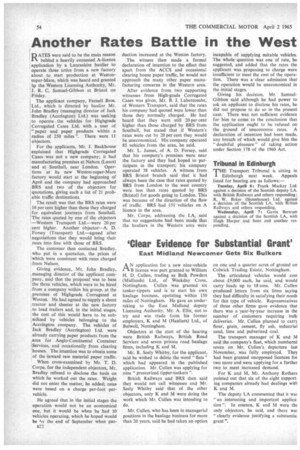Another Rates Battle in the West
Page 56

If you've noticed an error in this article please click here to report it so we can fix it.
1:10 ATES were said to be the main reason %. behind a heavily contested A-licence ; application by a Lancashire haulier to ' operate three artics from a new factory about to start production at Westonsuper-Mare, which was heard and granted by the Western Licensing Authority, Mr. L. R. C. Samuel-Gibbon at Bristol on Friday.
The applicant company, Farnell Bros. Ltd., which is directed by haulier Mr. John Bradley (managing director of Jack Bradley (Accrington) Ltd.) was seeking to operate the vehicles for Highgrade Corrugated Cases Ltd. with a user of " paper and paper products within a radius of 250 miles ". There were 11 objectors.
For the applicants, Mr. J. Backhouse explained that . Highgrade Corrugated Cases was not a new company; it had manufacturing premises at Nelson (Lanes) and at Southall, near London. Opertions at its new Weston-super-Mare factory would start at the beginning of April and the company had approached BRS and two of the objectors for quotations, giving each a list of 21 probable traffic destinations.
The result was that the BRS rates were 16 per cent higher than those they charged for equivalent journeys from Southall. The rates quoted by one of the objectors —Western Transport Ltd.—were 20 per cent higher, Another objector—A. D. Forsey (Transport) Ltd.—agreed after negotiations that they would bring their rates into line with those of BRS.
The customer then contacted Bradley, who put in a quotation, the prices of 'which were consistent with rates charged from Nelson.
Giving evidence, Mr. John Bradley, managing director of the applicant cornpany, said that the proposal was to base , the three vehicles, which were to be hired from a company within his group, at the ; premises of Highgrade Corrugated at Weston. He had agreed to supply a shunt :tractor and sheeter at the new factory I to load trailers and, in the initial stages, the cost of this would have to be subsidized by vehicles belonging to the . Accrington company. The vehicles of Jack Bradley (Accrington) Ltd. were already carrying paper products from the area for Anglo-Continental Container IServices, and occasionally from clearing houses. The intention was to obtain some of the inward raw material paper traffic.
When cross-examined by Mr. T. D. Corpe, for the independent objectors, Mr. Bradley refused to disclose the basis on which he worked out the rates. Weight did not enter the matter, he added; rates were based on a charge per-foot pervehicle.
He agreed that in the initial stages the operation would not be an economical one, but it would be when he had 10 vehicles operating, which he hoped would be Plv the end of September when pro duction increased at the Weston factory.
The witness then made a formal declaration of intention to the effect that apart from the ACCS and occasional clearing house paper traffic, be would not approach the many other paper manufacturing concerns in the Western area.
After evidence from two supporting witnesses from High-grade Corrugated Cases was given, Mr. B. J. Labercombe, of Western Transport, said that the rates his company had quoted were lower than those they normally charged. He had heard that they were still 20 per cent higher than those charged by BRS from Southall, but stated that if Western's rates were cut by 20 per cent they would be uneconomical. His company operated 85 vehicles from the area, he said.
Mr. L. James, of A. O. Forsey, said that his company's premises were near the factory and they had hoped to participate in the transport; his company operated 38 vehicles. A witness from BRS Bristol branch said that it had always been the case that rates quoted by I3RS from London to the west country were less than rates quoted by BRS (Bristol) for goods going to London. This was because of the direction of the flow of traffic. BRS had 151 vehicles on A licence in the area.
Mr. Corpe, addressing the LA, said that no suggestions had been made that the hauliers in the Western area were incapable of supplying suitable vehicles. The whole question was one of rate, he suggested, and added that the rates the applicant was proposing to charge were insufficient to meet the cost of the operation. There was ar clear admission that the operation would be uneconomical in the initial stages.
Giving his decision, Mr. SamuelGibbon said although he had power to ask an applicant to disclose his rates, he did not propose to do so in the present case. There was not sufficient evidence for him to come to the conclusion that the application ought to be refused on the ground of uneconomic rates. A declaration of intention had been made, any breach of which would give him the "doubtful pleasure" of taking action under Section 178 of the 1960 Act.


































































































































































